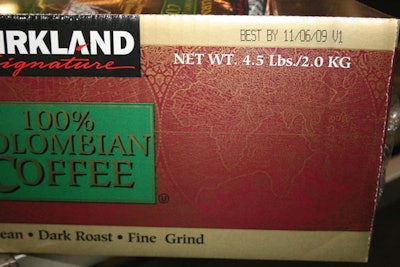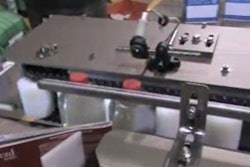The newest of four Hitachi continuous ink-jet printers to be installed at Massimo Zanetti Beverage’s Suffolk, VA, plant arrived first quarter of this year. The Model PXR produces best-before dates on paperboard trays or corrugated cases holding pouched coffee.
Elsewhere in the plant, the other Hitachi printers are used for coding both steel cans and paperboard trays.
“Other systems I’ve used require a lot of maintenance and operator intervention,” says Mike Barnes, director of maintenance and engineering at the Suffolk plant. “With these printers from Hitachi, day in/day out maintenance is a simple purge and shut down cycle. They’re basically maintenance-free. We run 24 hours per day five days a week. We do a quick inspection of the print head on Sunday and clean if needed. Then we run the entire week without any issues.”
Also appealing, says Barnes, is the quality and legibility of the coding that the Hitachi units deliver.
“The glossy coating on the paperboard tray makes for a surface that is not the easiest to mark,” says Barnes. “But these Hitachi printers don’t have any problem. It’s a combination of the machine and the ink.” The ink in this case, notes Barnes, is a JP-K67 Fast Dry ink, also supplied by Hitachi. Adds Barnes, “Not only is it more effective, we’re even saving a little money on it compared to the ink we used before.”
Because MZB packs as many sizes and varieties as it does, frequent changes in coding information are a constant.
“We change from one code to the next very easily on the touch screen of the Hitachi. It’s a matter of scrolling down the menu and picking the code you need, or if it’s a new code, you enter that information right there on the touch screen. We also get requests from some customers for specific information, like an SKU, for example. Or a private-label customer may want to print information that’s unique to their package.”
As for speed, Barnes says the printers are perfectly capable of 450 cans/min or 100 pouches/min.
“I believe we were one of the first in North America to install Hitachi ink-jet units,” says Barnes. “We’ve seen our line efficiency increase by more than five percent, and unplanned downtime related to coding is virtually eliminated. Going forward, it’s the only ink-jet system I’ll buy.”
























